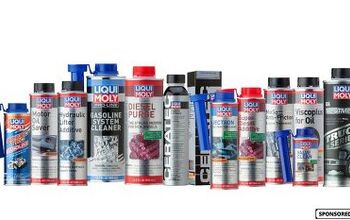Should You Use Synthetic Oil in Your Vehicle?

Last week we explained the basics of motor oil, from viscosity to additives and everything in between. Now it’s time to tackle a much more contentious issue: synthetic versus conventional. Which lubricant should you use in your vehicle? Is the extra protection afforded by man-made oil worth the added expense?
Synthetic Versus Conventional
By comparison, synthetic oils are typically manmade, though not necessarily, a point addressed later in this article. Martin said “[they] are usually derived from natural gas or alcohol,” meaning they’re pure from the get-go, containing no undesirable contaminants. They’re also more stable at a variety of temperatures. They don’t thin out as much when they get hot or excessively thicken in cold weather.
Z. George Zhang, PhD and CLS manager of Valvoline’s R&D Lab in Lexington, Kentucky said, “the better oil, like a synthetic oil, the VI (viscosity index) will be higher – [meaning] the viscosity changes less with temperature, which is a desirable trait.”
Further complicating things, many refiners offer synthetic blends. These oils are generally less expensive than pure-bred synthetics, but they also offer less protection. As always, you get what you pay for.
Synthetic Advantages
Another major benefit of synthetic oil is molecular consistency. Being an impure substance, conventional lubricants are made up of molecules that are all different lengths. According to Zhang, there are small, medium and long hydrocarbon chains. Synthetic oil is comprised of only medium-length molecules.
The problem with conventional oil is that those short, lightweight hydrocarbons tend to burn off when they get hot. This causes the oil to thicken the longer it’s in an engine.
Aside from that, synthetic oils also handle high temperatures better than conventional lubricants. They’re better at transferring heat, meaning synthetic oils can actually help a vehicle’s engine run cooler.
Being more resistant to breakdown or “shearing,” synthetics are much more robust than conventional lubricants, something that can really pay off. According to Martin the drain interval can safely be extended anywhere from 10,000 to 12,000 miles, or three to four times normal oil, while the added cost of synthetic is nowhere close to that.
Some niche oil companies advocate even longer drain intervals, up to 25,000 miles, but this is quite extreme and not something Zhang recommends.
BETTER FUEL ECONOMY FROM SYNETHETIC OIL?
Of course there are other ways to save money at the pump. Pete Misangyi, Supervisor of Fuels and Lubricants at Ford said they’ve switched to lighter weight 5W-20 oils in order to trim fuel consumption. These oils are easier to pump, meaning less energy is wasted.
Ford has also started to use variable-displacement oil pumps, which move less oil at lower engine speeds to help boost efficiency even further. With these improvements, Ford has started advocating 10,000-mile change intervals on its vehicles, helping lower maintenance costs for customers.
Magic Ingredients
Petroleum-based lubricants have many disadvantages compared to their synthetic counterparts, but there’s more to oil than oil. “We’re not just relying on the synthetic base stocks for the benefits of Royal Purple” Martin said. “[It’s] really just a carrier for the additives” he said, noting “I would take a well-formulated mineral oil over a poorly formulated synthetic oil.”
Downsides: Dispelling Rumors
Of course the benefits of synthetic come at a price. They’re usually several times more expensive than old-fashioned lubricants. But with longer drain intervals and improved fuel economy “the benefits of synthetic justify the expense,” Martin said.
Many of the other down-sides about synthetic oil simply aren’t true, including the notion that you can’t switch to it if a vehicle has been on conventional oil for a long time, as well as the idea that it should be avoided in older, high-mileage cars.
Zhang said decades ago synthetic-oil makers didn’t pay attention to seal compatibility, which caused seals and gaskets to harden or get brittle, leading to leaks and other issues. This is where these myths about synthetic oil likely originated. But he points out that was 20 years ago or more and “that’s not an issue anymore.” Misangyi seconds this. He said “a proper [oil] blend shouldn’t have any issues.”
Group III versus Group IV: When Synthetic Isn’t
As mentioned earlier, not all synthetics are created equal. As you’d expect, many are formulated in laboratories, but unbelievably some are actually made from crude oil! How can they be labeled as “synthetic” if they’re made from petroleum?
Engine oils are classified into five different groups. For this explanation we’re focusing on Group III and Group IV lubricants. Group III oil is a very highly refined conventional product. Group IV lubes are made from synthetic sources, oftentimes natural gas. They’re also known as PAO base stocks, which is short for polyalphaolefin. Don’t worry; you won’t be tested on this.
From a performance standpoint Group III and Group IV oils are essentially identical, so don’t lose any sleep over this distinction. Zhang said under scientific analysis he has a hard time telling them apart.
Other Oil Myths
On the subject of engine oil there are several other common myths worth noting. One of them has to do with break-in lubricants.
A lot of people seem to think automakers fill engines with special oil from the factory that’s designed to help them break in quickly. According to Misangyi this is “generally a myth.”
Additives are another hot oil topic. Companies sell all kinds of supplements but Zhang says caveat emptor – buyer beware. He doesn’t recommend them, noting “you’re not getting the benefits [they claim].” It’s best to steer clear of these products and instead use quality oil and change it at a reasonable interval.
Which is Right for You?
It’s probably hard to buy a bad lubricant these days. Even the most basic conventional oils available on the market are far better than ones offered just a few decades ago.
According to Zhang, it’s ok to use a quality petroleum-based oil in the average car, but with high-performance vehicles he recommends synthetic. Ultimately he said “follow the OEM’s recommendations.”
For Martin, “the benefits of synthetic justify the expense,” with longer drain intervals, reduced deposit formation and slightly better fuel economy. Misangyi also favors synthetics. Some of the benefits he cited include “longer engine oil life [and] reduced deposits,” thought he also recommends following what’s in the owner’s guide.
GALLERY: Should You Use Synthetic Oil in Your Car?

Born and raised in metro Detroit, Craig was steeped in mechanics from childhood. He feels as much at home with a wrench or welding gun in his hand as he does behind the wheel or in front of a camera. Putting his Bachelor's Degree in Journalism to good use, he's always pumping out videos, reviews, and features for AutoGuide.com. When the workday is over, he can be found out driving his fully restored 1936 Ford V8 sedan. Craig has covered the automotive industry full time for more than 10 years and is a member of the Automotive Press Association (APA) and Midwest Automotive Media Association (MAMA).
More by Craig Cole




































Comments
Join the conversation
My mechanic said that if you start using a synthetic or synthetic blend for more than two oil changes, you should not go back to mineral based oil....Any comment about this
I have switched from Dino to synth, and have found it causes leaks. I can smell burning oil when I shit off and get out of the car. I switched back to Dino and this doesn't happen. I will stay with Dino as I do 3k Oci on my Versa.